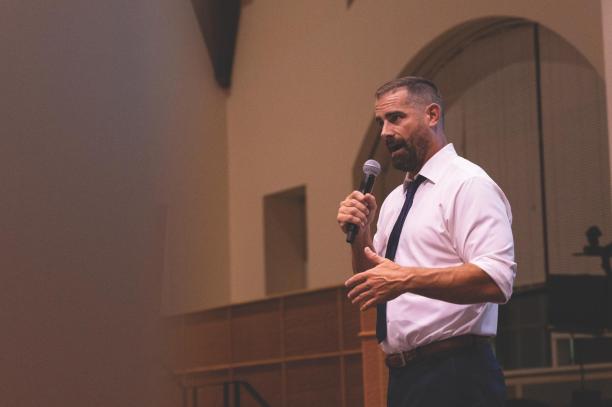
When Pennsylvania State Rep. Brian Sims was 11 years old, he told everyone he wanted to be a “feminist lawyer” when he grew up. What he didn’t predict is that he would climb the ladder as a civil rights attorney and go on to advocate for LGBTQ Pennsylvanians in the State House of Representatives.
Sims spoke at Quinnipiac University’s Mount Carmel Auditorium in a co-sponsored event hosted by the Quinnipiac Democrats and the Gender Sexuality Alliance on Oct. 18. Sims has served as the representative for Philadelphia’s District 182nd for 10 years, as the state’s first openly gay statewide elected official.
Paul Cappuzzo, president of the Quinnipiac Democrats and a senior political science and economics double major described Sims as a “firebrand”: a radical agitator in politics, according to the Oxford English Dictionary. Cappuzzo said it was an easy decision to bring Sims in to speak during LGBTQ History Month.
“I really hope that students were able to identify with things that he said, whether it be his story, whether it was when he came out, or the politics,” Cappuzzo said.
In addition, Cappuzzo said it was particularly memorable that Sims gave up his seat when running for Pennsylvania lieutenant governor earlier this year, though it is not required. Sims instead supported Deja Alvarez,, a transgender Latina woman who lost the 2022 Democratic primary for the party’s nomination.
“I really hope that people learned and were able to take away the sense that politics isn’t always about power, doing things for your own self in a self-help way,” Cappuzzo said. “You can also be the bigger person; you can also go ahead and relinquish that power.”
Sims’ time in office is coming to an end with the Nov. 8 Pennsylvania General Election, having run an unsuccessful primary campaign for lieutenant governor earlier this year. Sims lost the Democratic nomination in June to Rep. Austin Davis. Looking back at his career and early life, Sims shared advice about allyship with Quinnipiac students.
“There is something within the privilege structure called the privilege within privilege,” Sims said. “It turns out if you have a particular type of privilege, other people who share that privilege with you are more likely to hear you combat that privilege than the people who are the negative recipients for that privilege.”
This idea led Sims, a white, cisgender man, to stand up for women’s and transgender rights issues and racial equality. Throughout his time in office, Sims has supported policies such as equal pay, gun regulation, energy sustainability, comprehensive sex education and a ban on gay conversion therapy.
“A racist white mind will give a pass to another Black person, even a white person who disagrees with them, before they will give a pass to a person of color to explain why racism is so wrong,” Sims said. “Because of that, we are required to use our privileges to combat privilege.”
Sims is the son of two retired army lieutenant colonels. Like a typical military kid, Sims said, he spent his childhood moving around army bases in all 50 states, living in 17 of them.

After his parent’s retirement from the army, Sims’ family moved to Southeast Pennsylvania when he was in eighth grade. It was here that Sims started playing football, the sport that would take him through high school and to Bloomsburg University of Pennsylvania.
“I went there to play football and I think I knew the moment that I got there that I had made a good choice for football, I might not have made the best choice for closeted me,” Sims said. “This was a school in the middle of nowhere that didn’t have the Gay Straight Alliance. It didn’t have an LGBTQ group. It had nothing.”
In his senior year of college, Sims was voted captain of his football team. He told the audience about losing a national championship and subsequently coming out to a friend– the quarterback of his football team– during a trip to his twin brother’s college.
“He just stops me, looks me up and he goes, ‘Yo Sims, are you gay?’” Sims said. “… I had been wondering for four years when my roommates would figure out how gay I am. Like, I’m gay. I’m really gay. Like in my best days, I’m especially gay.”
Sims came out to the rest of his football teammates and his parents, both of whom offered him support and acceptance. After becoming the first openly gay college football captain in NCAA history, Sims went on to attend Michigan State University College of Law.
Sims said that he had no interest in running for office until he heard about a transphobic comment from then-incumbent Democratic Rep. Babette Jones, who had been in office for 28 years at the time.
During his first bid for office in 2012, Sims raised about $250,000 and won his election by just 253 votes. Since then, he has been touting the utility of diversity and the power of allyship.
Sims closed out his speech by telling students, “I want all of you to run for office.”
He implored the crowd that young people are the future of inclusive politics, which he said makes him optimistic about what happens next.







